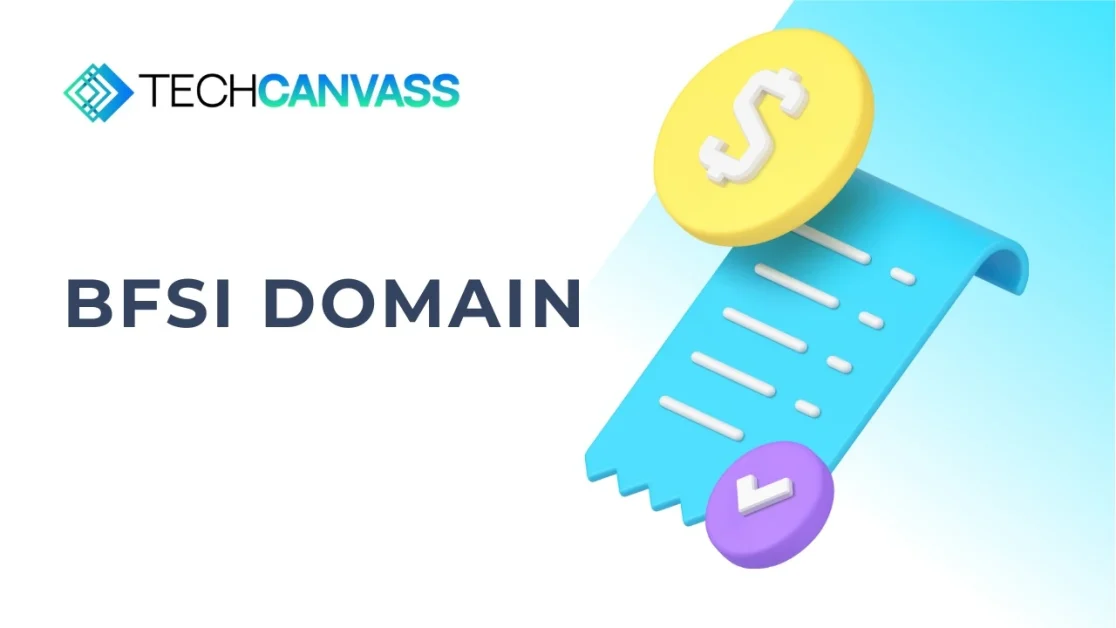Overview of BFSI Domain
BFSI stands for Banking, Financial Services, and Insurance. The BFSI sector includes a collection of financial institutions such as banks, brokerage firms, insurance companies, financial regulators, responsible authorities, and global organizations.
As of 2023, the global BFSI market was valued at a staggering $20.5 trillion and is expected to grow at a compound annual rate of 6.2% from 2023 to 2030. (Source: Grand View Research)
Significance of the BFSI Sector:
The BFSI sector is a critical element of the economy. Organizations of the BFSI sector help to enhance the possibility of the accumulation and circulation of capital, granting business owners to expand their businesses, and giving individuals the possibility to manage their finances properly.
Interestingly, the World Bank data shows that the percentage of global GDP, controlled by the BFSI sector, has been more than 20%. The BFSI sector carries out this important task by generating income, which helps to reduce the risks that can cause economic shocks in the country, and by ensuring that diversification of the economy is reached. In 2008, during one of the most significant financial crises of our times, the BFSI sector’s resilience helped prevent a complete economic collapse.
Sectors of BFSI
Banking
The Banking sector embraces all the entities that may include banks, credit unions, and other types of financial businesses that service the customers in terms of accepting deposits and making loans among others. As of 2022, the number of commercial banks in the US is about 4,500, and the assets value is more than $24 trillion (Source: Federal Reserves).
Useful Links: Fundamentals of Banking Domain | Banking Domain Training
Financial Services:
This broad category includes investment services, real estate, private equity, consumer credit, and other operating platforms, a utility for turning a profit. In 2022, the global financial services market has got its directions and is proportional to a value of $22. 5 trillion (Source: IBISWorld). Another way that the financial system serves a purpose beyond investments and money circulation is that it envelops financial market utilities that perform clearing and settlement operations that significantly reduce the financial risk within the transactions.
Insurance
The industry has the task of keeping individuals protected as well as the companies by cushioning risk. In 2022, the global insurance industry made a profit of more than $6. 3 trillion in premiums (Source: Statista).
Useful Links: Fundamentals of Insurance Domain | Insurance Domain Training
Checkout our BFSI Domain Training Courses
Techcanvass offers a number of domain training courses in Banking, Insurance, Payments, Trade Finance, Investment Banking, Supply Chain, US healthcare and Capital Markets.
Importance of BFSI Domain
The BFSI sector is a major driver of innovation and growth for the IT industry for several reasons:
High Demand for Digital Solutions:
As the technological development in the BFSI industries gains attention with customized services and operational efficiency it continuously integrates advanced BFSI solutions like blockchain for secure transactions and AI for personalized services. In 2022, technology was a top priority for the BFSI sector. Over $623 billion has been spent on IT services, of which, the banks alone shelled out $222 billion on this technology. (Source: Gartner)
An in-depth knowledge of the BFSI sector is necessary for every person who is connected with the financial pillar of the country’s economy, regardless of whether they are a consumer or a professional. IT solutions, moreover, provide savings as technology progresses as they enable efficiency in the Business, Finance, Services, and Insurance sectors aside from offering new avenues for growth. The BFSI market is expected to employ over 55 million people globally by 2025 (Source: Deloitte)
Data Management and Security:
BFSI institutions engage and keep the different kinds of personal and financial data where the IT industry implements cybersecurity measures, secure data storage, and faster data processing systems to ease performance. The global cybersecurity market of BFSI is projected to reach $51.4 billion by 2027. (Source: Markets and Markets)
Regulatory Compliance:
With BFSI industries subject to numerous regulations it becomes required to comply with them all. Policies and processes which might include sending notifications to employees about new updates, or the creation of compliance alerts are made possible by IT solutions. They also make it easy to keep up with new regulations. The RegTech industry dedicated to BFSI business was near $6. 3 billion in 2022. (Source: Juniper Research)
Innovation and Customer Retention:
In an era where disruptive fintech businesses are on an upward trajectory displacing traditional banks, BFSI companies have now all their eyes set on IT to create novel products and retain clients through enhancing their comfort levels. Globally, a total of $94 billion was invested in fintech startups in 2021. (Source: CB Insights)
How to get skilled in the BFSI domain?
Building a career in BFSI requires a strategic approach, focusing on both sector-specific knowledge and applicable technical skills:
Education:
Commence with a solid theoretical foundation in finance and economics through undergrad or graduate studies in these fields. The National Center for Education Statistics data shows that at least 300,000 students with finance/banking degrees have graduated in 2021, indicating a high interest in the said industry.
Specialization through Certifications:
Besides education, institutions offer Certified Public Accountant (CPA), Chartered Financial Analyst (CFA), or diplomas in insurance or risk management can be valuable. In 2022, over 200,000 people applied to the CFA test around the globe. (Source: CFA Institute)
Practical Experience:
Get on-the-job experience by taking internships or initial employment in financial companies. The real-world experience is invaluable and provides insight into the sector. The BFSI sector jobs market has been in recovery and employers like JPMorgan Chase, and Bank of America hired over 60,000 interns and entry-level staff in 2022. (Source: Company Reports)
Technological Proficiency:
Learn skills in emerging tech areas such as financial software tools, blockchain, AI, and machine learning which are vital technologies sections of BFSI. The worldwide market for AI in BFSI promises to reach $35. 4 billion by 2030. (Source: Allied Market Research)
Continuing Education and Networking:
Research the movements among the BFSI and IT industries and keep up with the latest news about them. Do it through your network, which you can improve by attending conferences, seminars, and workshops on these two industries. Beyond this, big events such as Money20/20 have exceeded the record with an annual attendance of 10,000 participants. (Source: Money20/20)
Conclusion
Domain knowledge is very important for almost all the IT professionals, but it is mandatory for Business Analysts, Data Analysts and Testers. Eliciting requirements, designing solutions for an organization or writing test cases will be very difficult without domain understanding.
If you are not familiar with any domains or business knowledge, you can start by choosing from one of the most in-demand domain training courses.



